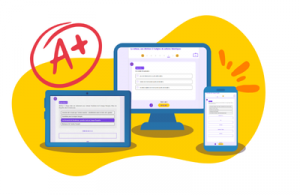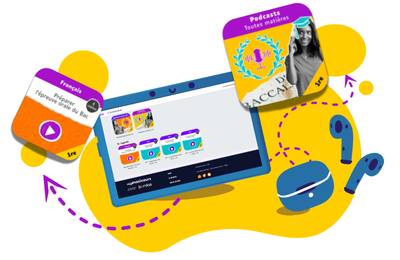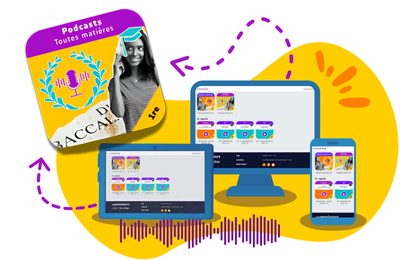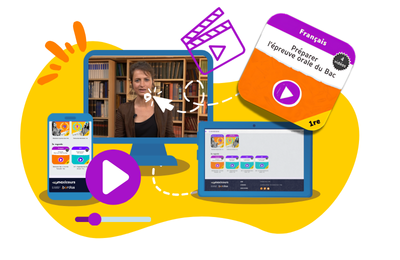Erasmus+
- Fiche de cours
- Quiz et exercices
- Vidéos et podcasts
Découvrir un aspect de la notion « Identités et échanges ».
- Le nom du programme vient de l’humaniste néerlandais Desiderius Erasmus (Érasme en français).
- Il est utilisé ici en tant qu’acronyme : European Region Action Scheme for the Mobility of University Students.
- Les conditions d'accès :
- avoir entre 18 et 30 ans ;
- avoir mené à bien sa première année d’études supérieures.
- Les buts :
- apprendre ou approfondir une langue ;
- s’ouvrir à d’autres cultures ; acquérir des compétences appréciées sur le marché du travail.
- Il existe différents « sous-programmes » en fonction des publics visés : équipes éducatives, étudiants, jeunes en formation professionnelle, collégiens/lycéens, etc.
Revoir les fondements de l'Union européenne
The Erasmus (European Region Action Scheme for the Mobility of University Students) programme is funded by the European Union which organises student exchanges. But it is not only an acronym.
Indeed, the name was chosen because Desiderius Erasmus (1467–1536), the greatest scholar of the Renaissance, was a Dutch Christian humanist who traveled all over Europe to discover new cultures and develop his humanism.
During the Renaissance period, humanism was seen as the spirit of learning that developed at the end of the Middle Ages with the revival of Latin texts and a renewed faith in the human being.
In 2014, Erasmus+ replaced Erasmus but the goal remains the same. The project should last until 2020. Then, a new programme will be implemented. For now, 33 countries take part in the scheme.
Erasmus+ was born from the addition of two existing programmes: Lifelong Learning Programme and Youth in Action. Two innovations have been brought to the programme.
- Students will soon be allowed to choose a destination outside Europe if they can find a partnership with a school.
- Newly-graduated students will be allowed to benefit from the programme.
It enables students to gain valuable experience by
studying or working as trainees in foreign countries.
These exchanges can last from three to twelve
months and students do not have to pay the fees of
the host university and they can get a grant (between
150€ and 300€ per month, depending on the
home university and the destination) to help them with
their living costs.
This scholarship can help students with travel,
accommodation, food and insurance fees. However, it may
not cover everything as the cost of living changes from
one country to another. Only downside, not all students
have benefitted from this miraculous windfall...
Over two million students have followed an Erasmus programme since it started in 1987. If you want to apply, you do not have to be a language student but you must be aged between 18 and 30 and have completed your first year at university.
As arrangements are passed between universities, you must contact your university coordinator who will give you all the details you need to know before starting this wonderful experience. And if you are lucky enough to get a place, your home university will contact your host university which will contact you then and give you all the relevant information about the admissions process.
It will be time for you to book a plane ticket and pack your bags!
As was said before, providing valuable experience is one of Erasmus’ goals, but there are some others which we must consider because they are very important, too.
First, of course, you have an opportunity to travel to a foreign country and live there from one semester to a year. Is there a better way to improve a language, to know a different culture, to meet new people, etc.? We do not think so.
But Erasmus is not only for socializing, it allows students to improve their skills. Of course, it looks good on a CV as a foreign experience is valued by recruiters when they decide to hire someone, as you learn new skills and gain relevant work experience.
If France, Spain, Germany or Italy are the most popular destinations, you can find new spots off the beaten track and discover Slovenia, Malta, Croatia or Latvia. Moreover, you can get an additional grant of 400€ if you choose the least popular countries, providing you find there your specific subject area.
Generally, students have plenty of time to discover the country they are studying or working in as the programme is long enough for them to enjoy the beauties of the place in their free time.
Erasmus+ also concerns teenagers aged 13 at least with the programme Youth in Action. It gives them the opportunity to take part in exchanges that last between 5 and 21 days. They meet new friends, improve their language skills, become more independent, expand their horizons and who knows, maybe they will choose another programme when they are older.
Last but not least, nearly one in ten students meet their wife or husband while abroad! Well, we can say that a new generation of students has emerged in the past years and we could call it the Erasmus generation.
Oh yes, there is one drawback though. It is the same as the one which hits holidaymakers coming back home, the post-Erasmus syndrome, but nobody can cure it!
This programme seems to have a lot of advantages and no drawbacks at all, doesn’t it? So, why hesitate?

Des quiz et exercices pour mieux assimiler sa leçon
La plateforme de soutien scolaire en ligne myMaxicours propose des quiz et exercices en accompagnement de chaque fiche de cours. Les exercices permettent de vérifier si la leçon est bien comprise ou s’il reste encore des notions à revoir.

Des exercices variés pour ne pas s’ennuyer
Les exercices se déclinent sous toutes leurs formes sur myMaxicours ! Selon la matière et la classe étudiées, retrouvez des dictées, des mots à relier ou encore des phrases à compléter, mais aussi des textes à trous et bien d’autres formats !
Dans les classes de primaire, l’accent est mis sur des exercices illustrés très ludiques pour motiver les plus jeunes.

Des quiz pour une évaluation en direct
Les quiz et exercices permettent d’avoir un retour immédiat sur la bonne compréhension du cours. Une fois toutes les réponses communiquées, le résultat s’affiche à l’écran et permet à l’élève de se situer immédiatement.
myMaxicours offre des solutions efficaces de révision grâce aux fiches de cours et aux exercices associés. L’élève se rassure pour le prochain examen en testant ses connaissances au préalable.

Des vidéos et des podcasts pour apprendre différemment
Certains élèves ont une mémoire visuelle quand d’autres ont plutôt une mémoire auditive. myMaxicours s’adapte à tous les enfants et adolescents pour leur proposer un apprentissage serein et efficace.
Découvrez de nombreuses vidéos et podcasts en complément des fiches de cours et des exercices pour une année scolaire au top !

Des podcasts pour les révisions
La plateforme de soutien scolaire en ligne myMaxicours propose des podcasts de révision pour toutes les classes à examen : troisième, première et terminale.
Les ados peuvent écouter les différents cours afin de mieux les mémoriser en préparation de leurs examens. Des fiches de cours de différentes matières sont disponibles en podcasts ainsi qu’une préparation au grand oral avec de nombreux conseils pratiques.

Des vidéos de cours pour comprendre en image
Des vidéos de cours illustrent les notions principales à retenir et complètent les fiches de cours. De quoi réviser sa prochaine évaluation ou son prochain examen en toute confiance !









